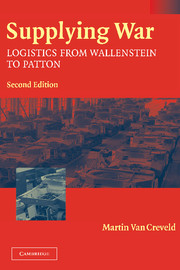Book contents
- Frontmatter
- Dedication
- Contents
- Maps
- Preface
- Introduction
- 1 The background of two centuries
- 2 'An army marches on its stomach!'
- 3 When demigods rode rails
- 4 The wheel that broke
- 5 Russian roulette
- 6 Sirte to Alamein
- 7 War of the accountants
- 8 Logistics in perspective
- Postscript: Where are we now?
- Note on sources
- Bibliography
- Notes
- Index
5 - Russian roulette
Published online by Cambridge University Press: 22 June 2023
- Frontmatter
- Dedication
- Contents
- Maps
- Preface
- Introduction
- 1 The background of two centuries
- 2 'An army marches on its stomach!'
- 3 When demigods rode rails
- 4 The wheel that broke
- 5 Russian roulette
- 6 Sirte to Alamein
- 7 War of the accountants
- 8 Logistics in perspective
- Postscript: Where are we now?
- Note on sources
- Bibliography
- Notes
- Index
Summary
Problems of the semi-motorized army
When Hitler came to power in January 1933 he brought with him a firm, if ill-defined, commitment to the modernization and mechanization of German life which, however useful and even necessary it may have been on economic and strategic grounds, cannot be adequately understood on the basis of utilitarianism alone. The National Socialist Party had always taken a great interest in motor-cars and made much use of them in its rallies, parades and demonstrations. It even incorporated a special drivers’ corps, the NSKK. Hitler himself loved cars, had a surprisingly good understanding of their technology and construction, and showed a lively interest in their engines, the men who drove them and the roads built for their use, far beyond the interest that a head of state could normally be expected to take in what was, after all, only one element in his country's system of transportation, and that not the most important. White-coloured Autobahnen and bug-shaped Volkswagens stood out as National Socialist showpieces par excellence. Far from being merely an instrument in the hands of the Third Reich, the motor-car stood, in more ways than one, as its symbol.
From the point of view of the German Army, especially from that of the various departments responsible for supply and transportation, this state of affairs was a mixed blessing. The problem was mainly that Hitler, in this field as in all others, took no interest in administrative detail, nor did he have the patience to carry through the long-term projects which alone might eventually have provided him with a well-balanced motorized army. Instead he had an eye for the spectacular and wanted quick results hence his strong tendency to concentrate on the two ends of the scale, the decorative-representational on the one hand and the tactical on the other. After a few years of National Socialist domination the results of this policy could be seen almost daily in countless parades and military tattoos. Along with the columns of vehicles carrying Nazi dignitaries there came armoured and motorized units with their serried ranks of Panzers and other fighting vehicles.
- Type
- Chapter
- Information
- Supplying WarLogistics from Wallenstein to Patton, pp. 142 - 180Publisher: Cambridge University PressPrint publication year: 2004
- 1
- Cited by



